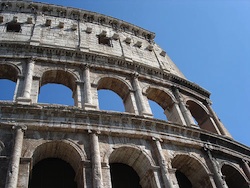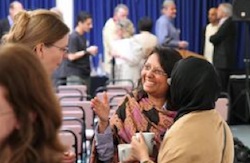| |
|
 |
ARC blogs for Club of Rome about how belief is vital for saving the world
January 10, 2012:
 |
 |
 |
Photo: Creative Commons Russell Yarwood. |
How beliefs, values, ethos and inspiration are essential for saving the world.This blog was written by ARC's Secretary-General Martin Palmer at the invitation of the Club of Rome, a global thinktank made up of independent leading personalities from politics, business and science, on the 40th anniversary of its Limits to Growth report. Link here for the Club of Rome website.
In 1972 the Club of Rome report Limits to Growth launched a new movement almost without realising it. The modern environmental and sustainable movement traces its roots back to this ground breaking report and the discussions and anxieties, which it explored.
It challenged a central myth – and I use that word carefully – that GDP was the only factor for quantifying success and that data was therefore the only way to measure significance. By challenging the myth of continual growth regardless of the cost to the earth and to many of its people, the report perhaps unintentionally undermined the normative value system, which had grown up post World War II.
 |
| "The truth is almost no-one has ever been convinced to change their lifestyle or their dominant myth by pie charts or log frames." |
|
 |
 |
This value system – indeed one can call it a belief system – is rooted in a particular phenomenological understanding of evolution and of human supremacy combined with any variety of other ideological supremacy models. This can be the Marxist notion of the Struggle against Nature; the capitalist view of nature as a resource and capital bank from which humans are at liberty to draw whatever they want; or the Protestant Christian model of a God-given right to dominate nature derived from the Bible.
Or it can be the Darwinist notion so often presented that humanity is the top of the evolutionary tree and that therefore, as in the anthropic cosmological principle, the whole universe has had the production of human life as its goal since the Big Bang. Rolled together these myths are very dangerous as the radical group Dark Mountain pointed out in their Manifesto of 2009:
The myth of progressThe myth of progress is founded on the myth of nature. The first tells us that we are destined for greatness; the second tells us that greatness is cost-free … Both tell us that we are apart from the world; that we began grunting in the primeval swamps, as a humble part of something called ‘nature’, which we have now triumphantly subdued … [O]ur separation from it [nature] is a myth integral to the triumph of our civilisation.[1]
Sadly, the original challenge of “Limits to Growth” became lost in exactly the mythological world outlined above. Instead of striving for alternatives, for different stories and narratives of true meaning, the report unleashed a mass of data filled, statistically dominated reports, programmes and even organisations. The perspective on the significance of the rest of nature became limited to its economic role resulting in the creation of terms such as ‘eco-system deliverables’. This manages for example to reduce the magnificence, the diversity and the power of the Amazon to being classified as a ‘carbon sink ‘ enabling us to carry on with our myth of progress and growth unhindered.
And these movements, founded on data and the supremacy of the human being have largely failed. The world is in a worse state than in 1972, though there are some encouraging signs.
 |
 |
 |
We need to tell more stories |
The truth is almost no-one has ever been convinced to change their lifestyle or their dominant myth by pie charts or log frames. Throughout history, as HRH the Duke of Edinburgh pointed out in 1986, only two forces have ever changed people’s basic values – the arts and religion and very often these have been one and the same thing. Which is why in 1986 The Duke of Edinburgh as International President of WWF invited five faith leaders to join him in Assisi, Italy, the birthplace of St. Frances, to see how the faiths could help to save the planet. The result is that 25 years later the religious environmental movement is the largest civil society movement on ecology worldwide yet it is largely ignored by the data believers!
One problem with the overall response to the Club of Rome report was the almost total ignorance of human psychology. Other than trying to use fear tactics – often couched in quasi-religious language of sin, guilt and fear – or alternatively offering vague utopian notions of a perfect world wrapped up in bits on indigenous language – the various movements which have been inspired by the Club of Rome initiative – be that environmental or developmental – have largely failed to study how and why people change.
The apotheosis of this came with the disaster of the Copenhagen COP in 2009. The attempt to build up a mass hysteria of fear, and of utopian hopes that 192 Governments would all agree to do the same thing collapsed into the shambles of that event and left many around the world disillusioned with intergovernmental agencies and programmes.
As a result, and chastened by this, many development and environmental groups have had to look at how they can learn from this and as a consequence have turned away from such a major focus on intergovernmental processes and instead returned to where many of them began, civil society. They are also beginning to take seriously studies in human psychology, which can help identify why people change.
The largest sector of civil society is the religions of the world. And they do not deal in the world of data and economics that have dominated and to a great degree destroyed the potential that the Club of Rome report unleashed 40 years ago. They, like the rest of humanity, know that we are a story telling species. When you introduce yourself to someone new, you don’t tend to tell them the data of your life – how much you weighed when you were born, not even usually the date you were born; nor how tall you are or what size shoes you wear. You tell your stories.
 |
 |
 |
"The largest sector of civil society is the religions of the world." PHOTO from ARC/WWF celebration of religions, Kathmandu, 2000 |
Stories are how for millennia the oldest human organisations in the world – the major faiths – have conveyed from generation to generation and across cultures and languages, their most profound truths, insights, beliefs and values. If you want to change the world – tell a good story – indeed, a good collection of stories.
A challenge to the Club of RomeAs the Club of Rome looks forward 40 years, the exciting challenge is to follow a different path. Instead of the focus being primarily on data itself, the Club of Rome is looking at how such data and information needs a wider context. This context is what is often described as values or even ethics. Values are the basis from which data and information is assessed, either consciously or more often than not, sub-consciously.
The way such values arise is from stories and from the ethos, which a culture creates. Ethics is but a small part of this because ethics is about what you aught to do. Ethos is about what you want to do because the values of your culture are all around you and part of you. Ethics can so swiftly turn into righteousness and condemnation. Many secular people want religion to be the same as ethics. It is not and in fact good religion often overturns conventional ethics because such ethics are dictatorial rather than responsive.
How to create an ethosIn order to create an ethos we need to tell stories. Let’s work with writers, poets, musicians and actors. Let’s use the world of imagination and of faith and have confidence to explore the great stories of the world’s religions, which have inspired and changed lives for centuries.
What might this mean? I believe this could be one of the most significant questions the Club of Rome could now seek to address. Let me first of clarify terms. A story is just that. A narrative is a succession of stories, which together build up to something more powerful than just a good story. To take the Hebrew Bible (Old Testament to use Christian terminology) as an example, the story of Noah and the Flood or of the Exodus are examples of stories. The narrative of the Hebrew Bible is that God cares for his people; that he is the creator of all and yet knows every one by their own name and loves them. That sin is a distortion of the natural order and brings consequences but also that redemption and salvation are real and that nations can be changed as well as individuals, for the better.
The greater narrativeCurrently we have many stories. The story of climate change; the story of the dying out of the tiger; the story of the recovery of the whale populations; the story of alternative energy technologies. What we lack is an overarching greater narrative which does the following:
- First of all places ourselves as a species in a wider context which is probably the universe but must then focus down to this planet and our place on and within it.
- Secondly gives us a sense of being part of nature not apart from nature as the current dominant ideologies and narratives we outlined above do.
- Thirdly, makes sense of human aspirations to overcome poverty, sickness, injustice and violence but does so within the wider narrative outlined in the two issues above.
- Fourthly, gives each community and each individual a sense of purpose, place and meaning within the greater universal narrative. This is what is usually referred to in religious narratives as salvation, liberation, enlightenment or redemption.
- Fifthly, provides models for dealing with failure, disaster, disappointment, suffering, pain and death.
- Sixthly, that gives us an understanding of the fact that the only constant is change. The oldest book still in daily use today as it has been for over three thousand years is the Chinese book called the I Ching. This means the Classic of Change. Change is the reality of this world and of our existence and yet so much of contemporary life is about trying to either stop change or deny it.
- Finally, the narrative has to take us back out to the bigger picture. To a sense that the future, difficult, perplexing, even dangerous, is still one with the potential for meaning and not just for us but for all life.
Discerning the valuesIt is within the context of such a greater narrative, filled with the vast array of stories which we each bring as individuals, communities, movements, Clubs of Rome, NGO’s etc, that we will begin to discern the values that can really guide and inspire us. Values, which emerge because they make narrative sense, not as a shopping list of virtues which is sometimes how they are presented.
This greater narrative will also be informed by the values which currently still underpin most cultures but which are in danger of being eroded away. Values such as the sanctity of human life; of the need for truth; of personal integrity and honesty; of justice for the oppressed and of both the need for rights but also duties. These values have on the whole evolved in ancient cultures where the idea that human beings were a direct threat to nature itself was unimaginable.
Therefore we need the bigger narrative to help us discover, articulate and embody new values relating to the rest of nature and our place within it now that we have become that threat. Currently virtually all our language about development, technology or the environment is as outsiders, Masters of the Universe if you will. This makes the evolution of new values about the significance of the rest of nature difficult because we simply lack the language to do this. This is why story tellers are such an important part of how cultures grow and change – be those artists or religious storytellers – and often the two are the same. They can experiment, try out new ideas, use language to go beyond convention. They can be bold and they can engage us with their boldness.
The challenge therefore is to assist in the creation of new stories which together can shape the new narrative from which can arise the new values as well as preserve the best of the old. This will not happen overnight. It will not happen because of a campaign. It will happen when we draw upon the richness of human experience, psychology, faith, drama, music and art to begin to tell a new way of seeing ourselves and our world. That is the challenge for the next forty years and to this, the data will bring urgency, knowledge and criteria.
I would suggest therefore that the values programme of the Club of Rome 40th be an invitation to the storytellers of the world to join us. Not to present just an empty page and ask them to write upon it but to take the seven points outlined above as a guideline and invite them to explore these first of all by themselves and then collectively and finally with the wider Club of Rome world of scientists, technologists and other such experts. In such an adventure the role of the media as the greatest storytelling medium of our time will be vital and I think the BBC for example would be very interested in being part of this experiment.
It is a very new direction for the Club of Rome but I believe it could prove to be one of the most significant it could undertake. And it would find many allies out there who will walk, talk, joke, weep, laugh and plot together with it as we narrate our way forward.
Together these worlds of narrative, values, belief, hope and knowledge might just enable us to literally imagine our way out of the crises.
|
 |
 |
|
|
|
|
|
 |
Vision and Strategy
ARC's vision is of people, through their beliefs, treading more gently upon the earth. Link here to find out how we achieve this.
|
 |
Projects overview
A complete listing of all current ARC projects |
 |
 |
|
|

